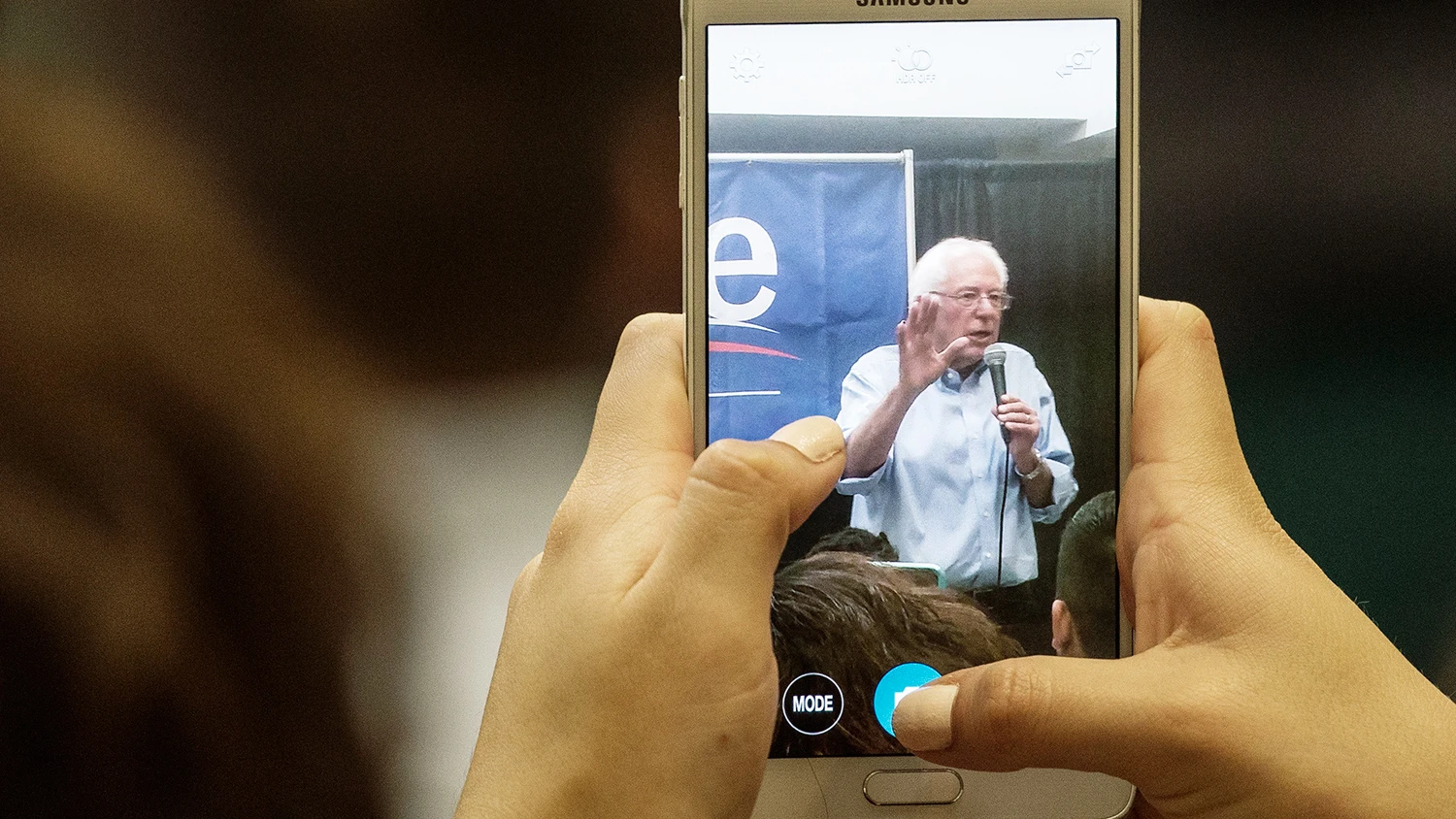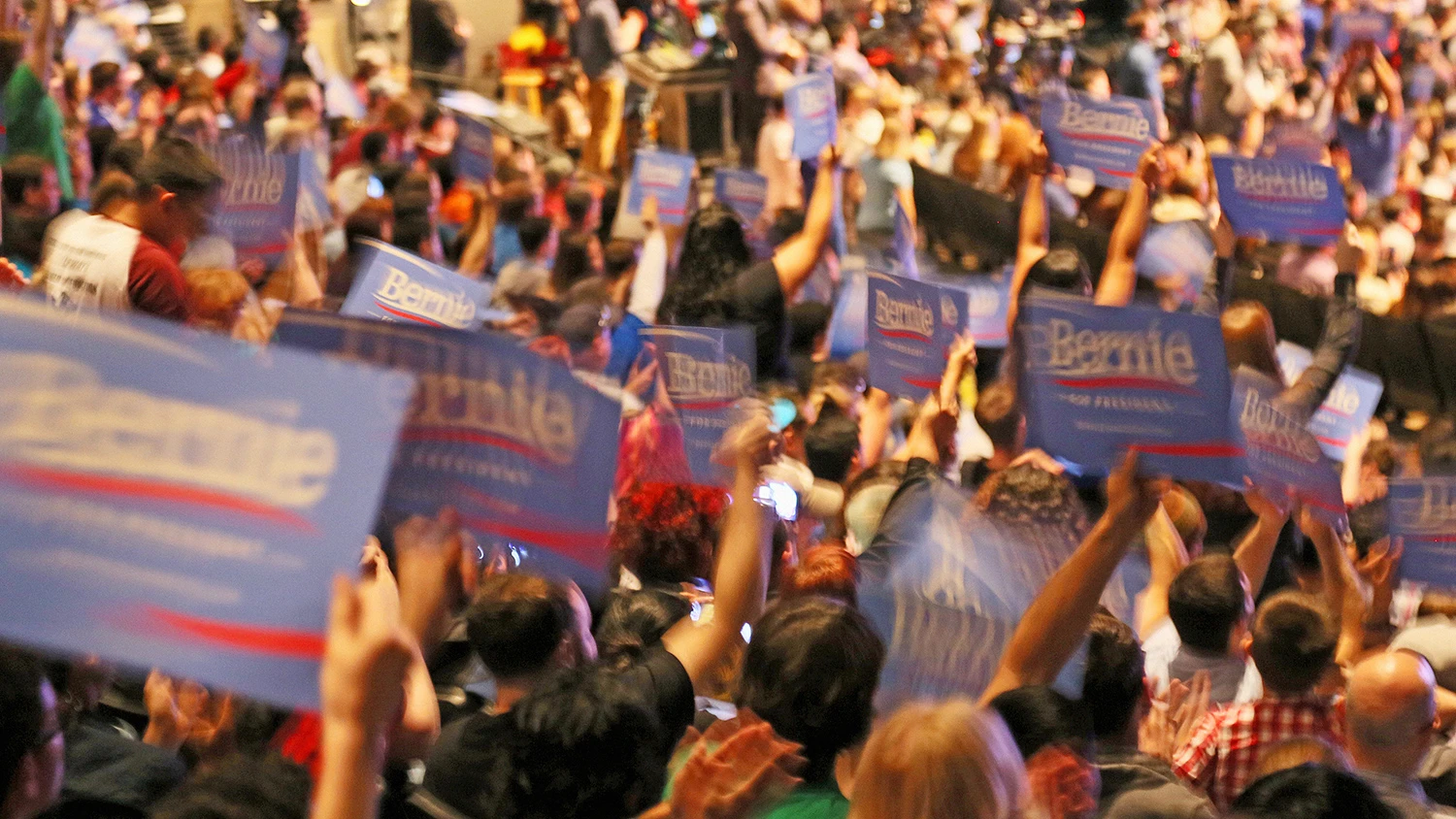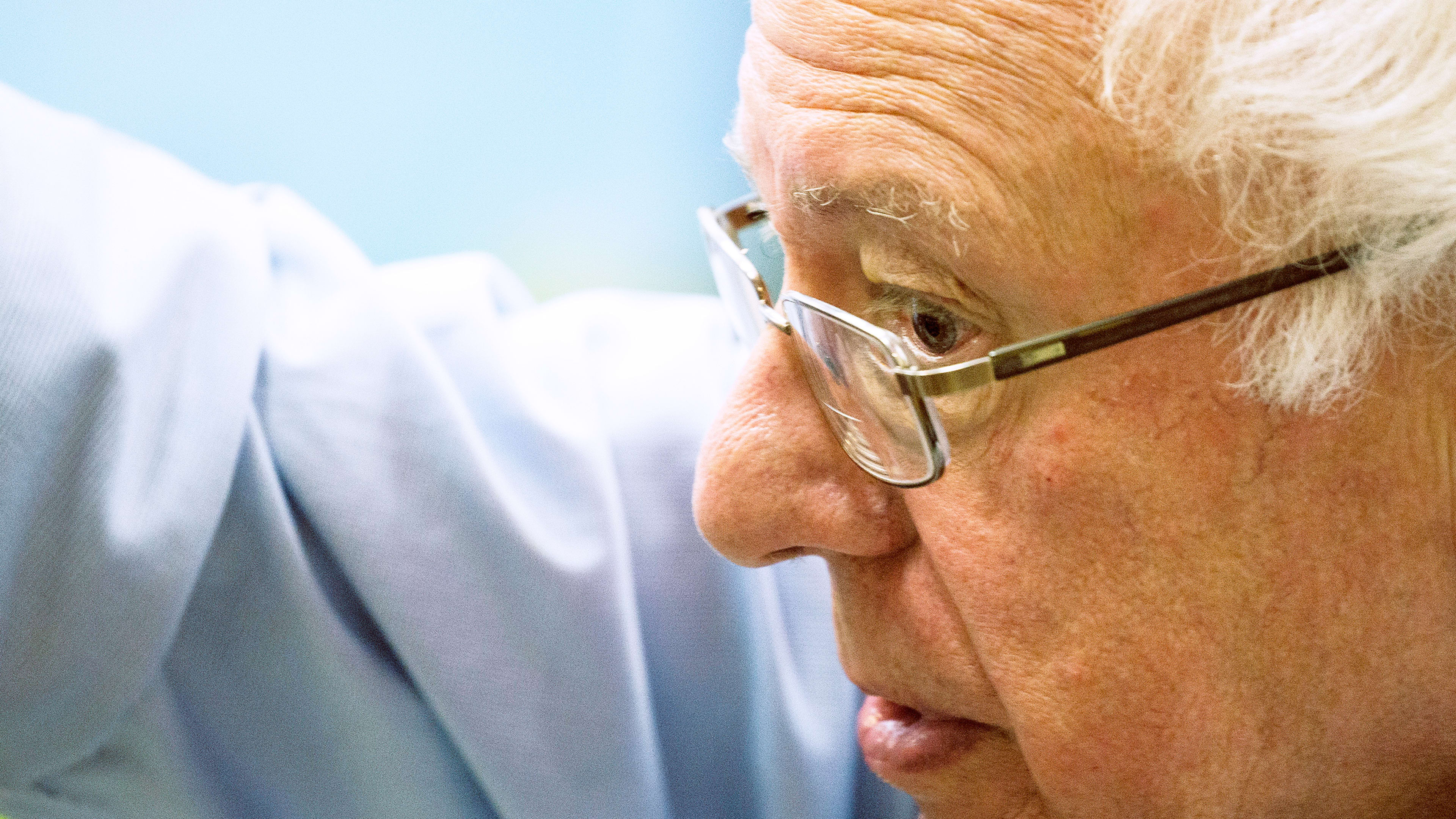Bernie Sanders didn’t lose the black vote on Super Tuesday–he lost it a long time ago.
Last summer, one of the most telling and memorable moments of the still-nascent Democratic presidential race took shape when two protesters affiliated with the “Black Lives Matter” movement interrupted the Vermont senator at a Social Security rally in Seattle, demanding his microphone and overtaking him at the podium. Despite the chorus of boos from a disappointed crowd, organizers failed to regain control of the event, prompting Sanders to cancel the speech and leave the premises. The disruption only lasted four and a half minutes, but that’s all it took for Sanders–an active participant in the 1960s civil rights movement and a proponent of reforming the country’s racially biased criminal justice system–to become “just another out-of-touch old white dude” in the eyes of many African Americans.
From that point forward, Sanders worked hard to reconnect with young African Americans in a variety of ways, including sitting down with the Black Lives Matter-affiliated civil rights activist DeRay Mckesson, playing up his involvement in protest movements (contrary to what many believe, Sanders did not actually march with Dr. Martin Luther King, Jr. in Selma), and releasing a “Racial Justice” platform aimed at “addressing the five central types of violence waged against black, brown, and indigenous Americans: physical, political, legal, economic and environmental.”
And the polls reflected his new outreach. For the first half of 2015, only 2% of black voters nationwide supported Sanders. And in early October, Sanders had the support of only 4% of the African American vote in South Carolina. But by December 28, things had started to turn around and Sanders had captured 12% of the African American vote across the country. By February 12, Sanders was narrowing the gap and Hillary Clinton’s lead among African Americans aged 18-29 had eroded to a margin of only 13% (46% to 33%), according to polling by Reuters/Ipsos. And by late February, Sanders had captured 28% of the total black vote in South Carolina, according to a CNN poll.
But Clinton was able to bounce back, through crucial endorsements from African American leaders and courting of voters in the Palmetto state. By the time of the South Carolina primary, she had regained some of that support, trouncing Sanders by 84% to 16% among African American voters in the state, according to exit polls.
By last night, Clinton’s triumph was complete. Across these Super Tuesday contests, about 8 in 10 blacks—women and men—voted for Clinton over Sanders in the Democratic primaries. In the 11 states that held their primaries yesterday, Clinton won every battleground where the percentage of African Americans exceeds that of the United States as a whole–13%–including Alabama and Georgia, where 25% and 30% of the state’s population is black, respectively.
Meanwhile, in the states Bernie did win–Minnesota, Colorado, Oklahoma, and Vermont–African Americans only make up 6%, 5%, 7%, and 1% of the population, respectively. Perhaps most telling is that even in his home state of Vermont, where support for Sanders should be highest, the senator still trailed Clinton by a small but significant margin, 43% to 57%. (Sanders lost the black millennial vote by roughly the same amount in South Carolina, a state Clinton won in a landslide).
Statistics like these show that Hillary’s lock on the black millennial vote is hardly unbreakable. But considering that Sanders still trails Clinton within this demographic, coupled with the fact that across the country she is winning between 80% and 90% of black voters as whole, means that he simply hasn’t gained ground among young African Americans quickly enough. And with many super delegates already casting their lot with Clinton and with the momentum of this race now squarely on her side, Sanders’s attempts to win over black millennials may come down to “too little, too late.”
Frankly it’s a bit astounding that Clinton is still decidedly winning the young black vote when one considers Sanders’s overwhelming support among youth in general. The senator won a whopping 84% of the ballots cast by voters under the age of 30 in the Iowa caucus; a week later in New Hampshire, Sanders won 83% of the millennial vote. Meanwhile, polls nationwide place Sanders as much as 58 percentage points ahead of Hillary among millennial voters.

But as much as young people love Sanders, African Americans seem to love Clinton even more, and they’re showing up to the polls at record rates–even surpassing the benchmarks set by President Obama in 2008. In fact, some prominent black intellectuals even consider Hillary a better choice than Obama for improving the lives of African Americans. On a recent episode of Real Time with Bill Maher, Michael Eric Dyson, author of The Black Presidency, said, “As a person who believes that Hillary Clinton will be the next president of the United States of America I’m telling you… I think that Hillary Clinton is not only the smartest person, the most prepared person, but the person who has given the most credible, empirical analysis of race in the last 20 years by a major American politician. I’ll stand by that.” And although Clinton’s record on racial justice has been attacked due to her association with husband Bill Clinton’s tough-on-crime policies in the 1990s, it’s this very association that’s endeared her to so many black voters–particularly those over 40, according to cultural anthropologist and millennial marketing expert Joseph Anthony.
“When you look at people like Hillary, she has the Clinton brand that was favorable to African Americans in the ’90s,” says Anthony, who began his career as a marketing manager at the New York Times before founding the millennial-focused marketing firm, The Hero Group. So enamored are older black voters of Hillary that in South Carolina she won votes from African Americans over 65 by an insane margin of 96% to 3%, in what’s practically a consensus.
Yet Anthony says there have been huge opportunities for Sanders to win over younger African Americans. “Young black voters don’t have that recollection of the golden era under Bill and his relationship with the African American community,” Sanders says. “They’re seeing people that look like them being shot down in the street.”
When it comes to addressing that very issue–police shootings–along with a host of other racial imbalances endemic in America’s criminal justice system, Sanders’s and Clinton’s platforms bear a striking resemblance to one another–perhaps one that’s too similar for Sanders to have really set himself apart. Both aim to leverage technology like body cameras to create more accountability and transparency among law enforcement officials; both seek to limit the flow of military-grade equipment to local police forces; both promote community policing intended to help rebuild trust between citizens and law enforcement; both would crack down on mandatory minimum sentences for nonviolent drug offenders while keeping judges who exercise racial biases in handing these sentences down in check; and both would bring an end to racial profiling.
If there’s anything that does set Sanders apart in this regard and gives him an advantage among young black voters, it’s the widespread perception–fair or not–of Hillary as a political insider and member of the Washington establishment elite that is especially damaging to her credibility on issues of social justice facing black communities.
“We live in this time when [young African Americans] feel we need radical changes,” says Anthony. “Young people are not necessarily excited by statements like, ‘I think Hillary will be able to get things done’ or ‘She’ll be able to run the country a lot smoother.’ Young people don’t want the country to run smoother. They want it to run the way it’s supposed to. Sometimes smoother isn’t the angle you want.”
Indeed, while the two candidates’ platforms are closely aligned, Sanders speaks and writes with greater passion when interfacing with the issues that matter most to young black Americans. Clinton, on the other hand, communicates in compassionate yet measured tones about the need for mass incarceration reforms and for “strengthening the bonds of trust between communities and police,” while Sanders freely invokes names like Michael Brown, Eric Garner, and Sandra Bland in his speeches and campaign materials, writing eloquently yet directly that “this violence fills us with outrage, disgust and a deep, deep sadness.”

But on Super Tuesday, none of that mattered. Granted, Sanders is by no means eliminated in this race–not mathematically or otherwise. And while Hillary’s support among older Americans and Sanders’s support among millennials is all but a foregone conclusion, young African Americans make up arguably the most important demographic for both candidates going forward. But with Sanders appearing to have hit a wall in eroding black millennials’ support for Hillary, has he run out of options?
Not yet. Anthony says Sanders needs to do more than simply win endorsements from older African American icons like Spike Lee and Al Sharpton, and that he should continue to double down on sparking dialogue with younger, “nontraditional black leaders” from the arena of pop culture, like he did with rapper Killer Mike.
‘[The strategy] used to be, ‘Just go to the Urban League, just go to the NAACP,’” Anthony says. “Not to take anything away from [Sharpton’s] legacy, but whether it’s aligning with Russell Simmons or [doing] what the president’s done – bringing in people like Kendrick Lamar into the Oval Office–candidates need to think outside the box. The civil rights era and the hip-hop era are two polarizing groups within African American audiences. But they have equally powerful voices.”
As for Hillary, what can she do to keep a comfortable cushion within this demographic between Sanders and herself? Anthony admits that many young voters would find it somewhat incongruous–or, in less charitable terms, inauthentic–to watch Hillary sit down with a young rapper. That’s not to say Hillary must sit back idly while young black voters slowly abandon her to join the Bernie camp.
“[Hillary] is bourgeois, she’s a little bit more highbrow, and she could very much benefit from an injection of grittiness and more grassroots engagement with people in a way that doesn’t seem contrived and that feels like a genuine interest in gaining an understanding,” Anthony says, adding that she could accomplish this by touring the South Side of Chicago; Flint, Michigan; or the Fifth Ward of Houston. “It would humanize her. The omnipotent brand of Clinton, while extremely aspirational, doesn’t seem as attainable anymore.”
But whatever overtures her campaign makes to young black America, it is essential that Clinton take herself out of her comfort zone, Anthony says–just like she did when agreeing to meet “in private” with Black Lives Matter activists last year. Hillary was unaware that the interview would be captured on tape and shared with the public. But this turned out to be a blessing in disguise. Although Clinton did not agree with everything the activists believed, nor did she make all (or perhaps any) of the assurances they wanted to hear, Anthony called it a “big win” for Hillary, adding that young African Americans and young people in general were impressed by her vulnerability, candor, transparency, and–most importantly–her humanity.
After Super Tuesday, Bernie Sanders isn’t dead, but the challenges seem almost insurmountable. And despite millennial America’s love affair with Sanders, if he does end up losing the nomination to Hillary, it will be because African Americans supported Hillary more than young people supported Bernie. Had Sanders handled the Black Lives Matter takeover in Seattle more gracefully, would things have turned out differently? Maybe, maybe not. But first impressions are hugely important, and sometimes all it takes is four and a half minutes to change everything.
Recognize your brand’s excellence by applying to this year’s Brands That Matter Awards before the early-rate deadline, May 3.
